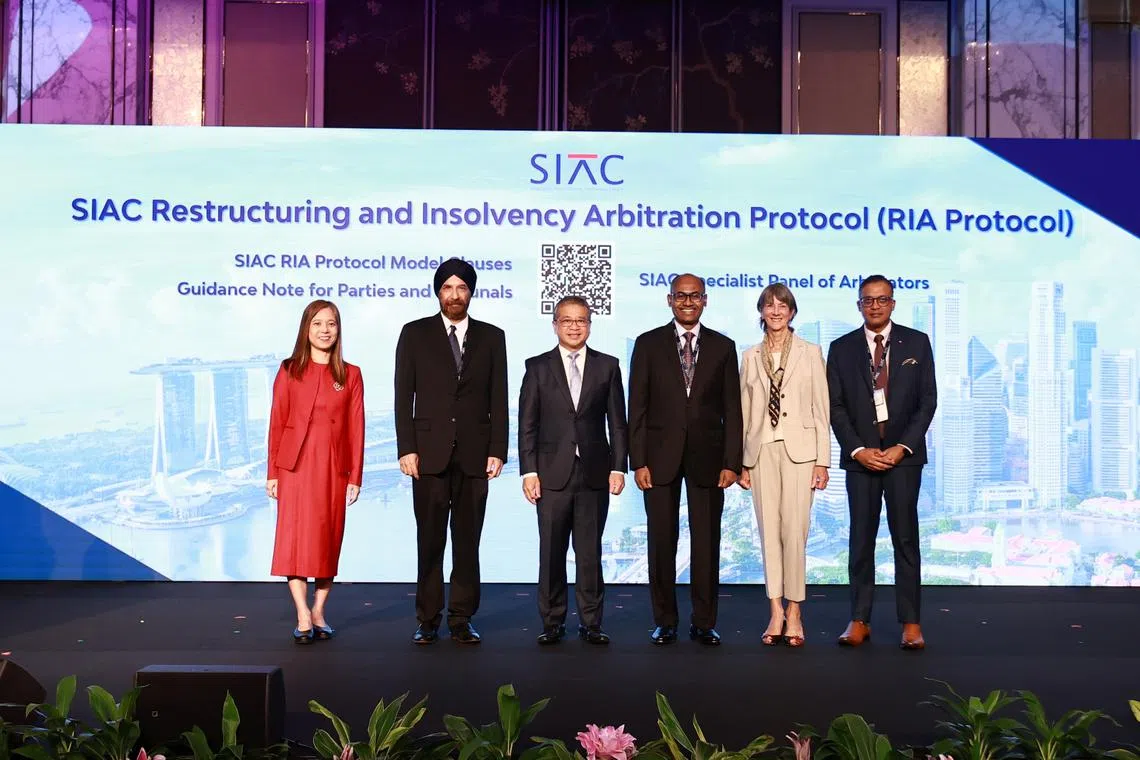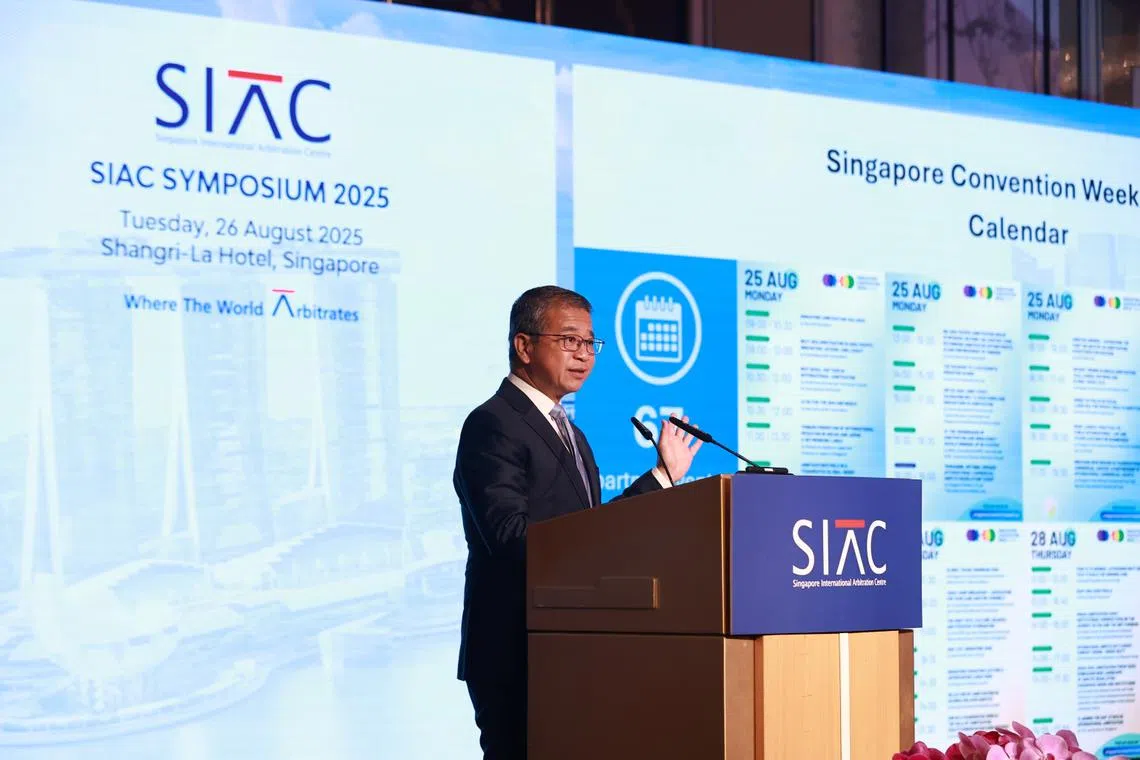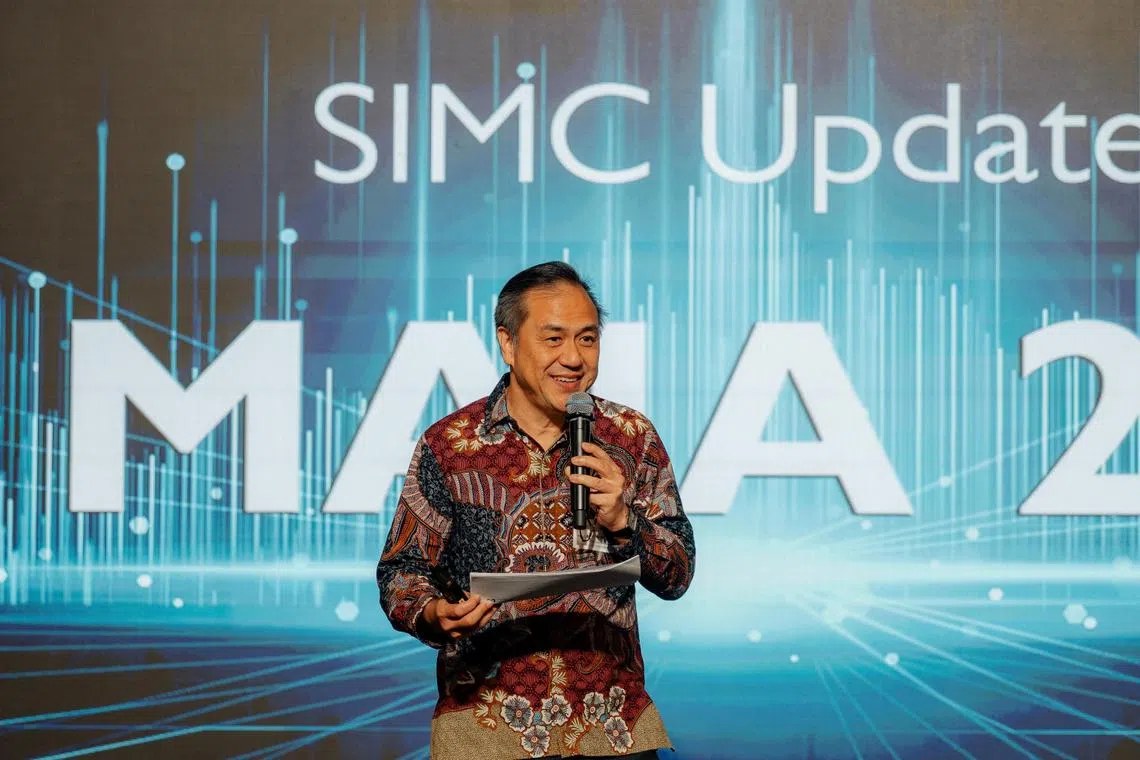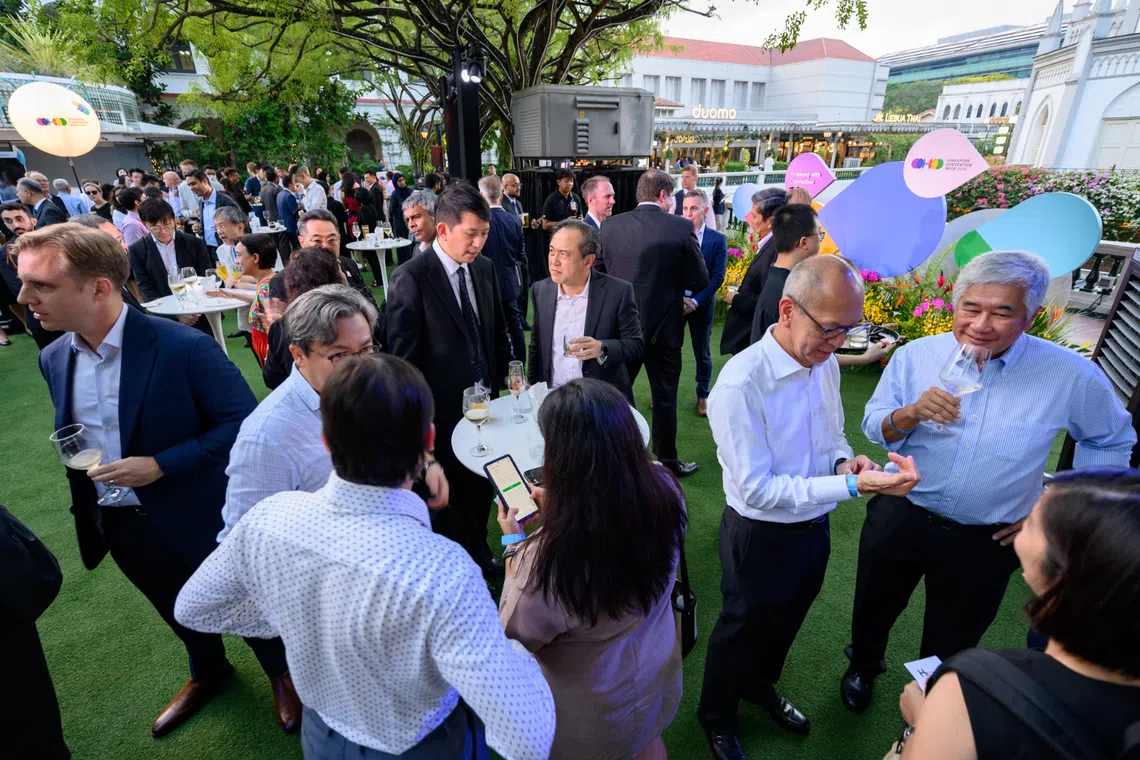Branded content
New protocols, AI tools: The legal community’s shift in dispute resolution practice
Diverse voices from over 70 jurisdictions came together at this year’s Singapore Convention Week to exchange ideas and strengthen ties

Minister for Law and Second Minister for Home Affairs Edwin Tong (third from left), Justice Kannan Ramesh (fourth from left), and representatives from the Singapore International Arbitration Centre (SIAC) officially launched the SIAC Restructuring and Insolvency Arbitration Protocol at the SIAC Symposium 2025. PHOTO: MINISTRY OF LAW
Few events bring together as diverse a gathering of top legal minds as the annual Singapore Convention Week (SC Week).
Held islandwide in Singapore from Aug 25 to 29, this year’s edition was attended by luminaries in the corporate and legal world to discuss the latest developments in international dispute resolution.
SC Week 2025 presented an expanded offering, featuring more than 60 partner events and drawing thousands of participants from over 70 jurisdictions.
The event brought together lawyers, in-house counsels, arbitrators, mediators, judges, policy makers and other legal professionals who represent and advise international corporations navigating new challenges in cross-border transactions and disputes.
At the Singapore International Arbitration Centre (SIAC) Symposium on Aug 26 – one of the signature events of SC Week – Mr Edwin Tong, Minister for Law and Second Minister for Home Affairs, launched the new Restructuring and Insolvency Arbitration (RIA) Protocol, the first of its kind for an international arbitration institution. It updates existing SIAC Arbitration Rules to the time-sensitive needs of parties involved in restructuring and insolvency proceedings.
“In today’s global economic landscape, marked by geopolitical tensions with rising corporate distress and looming debt pressures, there will likely be more restructuring and insolvency cases,” Mr Tong said in his keynote speech at the SIAC Symposium.

Minister for Law and Second Minister for Home Affairs Edwin Tong announced the launch of two new SIAC initiatives during his keynote speech at the SIAC Symposium. PHOTO: MINISTRY OF LAW
The RIA Protocol is accompanied by a model clause for parties looking to resolve disputes via the protocol, as well as a specialist panel of arbitrators for restructuring and insolvency disputes.
Mr Chahat Chawla, an international counsel at law firm Allen & Gledhill, welcomed the new RIA Protocol. “We often see elements of insolvency creep into arbitration and oftentimes that results in the arbitration grinding to a halt. This protocol will give guidance and a pathway to arbitrate insolvency-related disputes in Singapore. It will also further strengthen and define Singapore’s position as an insolvency and restructuring hub in Asia,” he said.
Ms Kate Lan, legal counsel at offshore law firm Carey Olsen, was also impressed by Singapore’s approach to economic uncertainty. “Singapore is always spearheading a lot of innovations and likewise, SIAC’s launch of the RIA Protocol is [anticipating] what the market needs,” said the lawyer.
In addition, the Law Minister also announced a new Institute of Ethics in International Arbitration under SIAC for targeted training, research and engagement in arbitration. He said in his speech: “I believe that platforms like these will be crucial, because it allows SIAC to take the lead in thought leadership in ethics. It is also crucial to advance the entire discourse on ethical practices and ethical values in international arbitration and important for us to preserve the essential conditions for the legitimacy of international arbitration.”
Charting the future with AI
SC Week 2025 also showcased how institutions in Singapore are staying at the forefront of legal innovations. The Singapore International Mediation Centre (SIMC), for instance, unveiled an updated version of its artificial intelligence (AI) assistant, Mediation AI Assistant (MAIA) 2.0.
In MAIA 1.0, the AI generated accurate summaries, chronologies of facts and identified parties and individuals, which received very positive feedback from mediators. The latest MAIA 2.0 includes new features such as providing constructive points and potential hurdles, possible interests and potential options to the mediators.
Maldivian lawyer Mohamed Shahdy Anwar, managing partner at S&A Lawyers, who saw a live demonstration of MAIA 2.0 presented by SIMC CEO Chuan Wee Meng, believes the increased adoption of AI will be a game changer in the legal profession.
“I think it’s very forward-thinking on the part of SIMC and the leadership should be commended for its approach and its openness on how it has adapted and used AI,” he said.

Singapore International Mediation Centre (SIMC) CEO Chuan Wee Meng announced the updated version of its AI assistant, Mediation AI Assistant (MAIA) 2.0 at the SIMC Mediating Amidst Global Fractures: Bridging a Multi-Polar World event held during Singapore Convention Week 2025. PHOTO: GODERIC TIA
Speaking at the sidelines of the launch of MAIA 2.0, Ms Shehara Varia, director of the International ADR Centre (IADRC) in Sri Lanka said SC Week was a chance for her to learn about the latest conversations in arbitration and mediation. She added: “IADRC Sri Lanka is working towards developing the ecosystem for commercial mediation in Sri Lanka and there is a lot to learn from Singapore.”
It was not all work and no play for attendees of SC Week 2025. Participants also had the chance to enjoy themselves at the traditionally popular networking event Breaking with Convention which was held at the historic Chjimes building complex.

Legal and business professionals connected over conversations in a more casual setting at the Breaking with Convention networking event. PHOTO: MINISTRY OF LAW
Many attendees of SC Week 2025 also expressed a strong interest to return for next year’s rendition, which will also celebrate the 60th anniversary of the United Nations Commission on International Trade Law.
Mr Chawla said: “SC Week is a great place to exchange ideas, debate on relevant and topical issues in international arbitration, and shape the future of international arbitration. Of course, it’s a great place to catch up with old friends and meet new ones.”
Giving mediation legal weight across borders
Mediation is a process in which a neutral third party – known as a mediator – facilitates a settlement agreement between disputing parties. However, countries vary in whether, when, as well as how such agreements are enforced.
A key milestone in the field of mediation was the adoption of the Singapore Convention on Mediation (Singapore Convention) by the United Nations General Assembly in 2018. It provides a legal framework for the recognition and enforcement of cross-border settlement agreements arising from mediation. This means that parties in cross-border disputes can enforce their agreements in countries that are party to the Singapore Convention.
To date, there are 58 signatories to the Singapore Convention and it is binding in 19 countries which have approved, acceded or ratified the treaty.
Find out more about the Singapore Convention Week 2025



